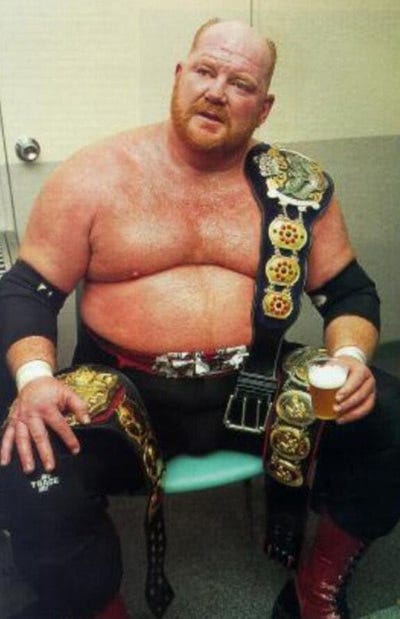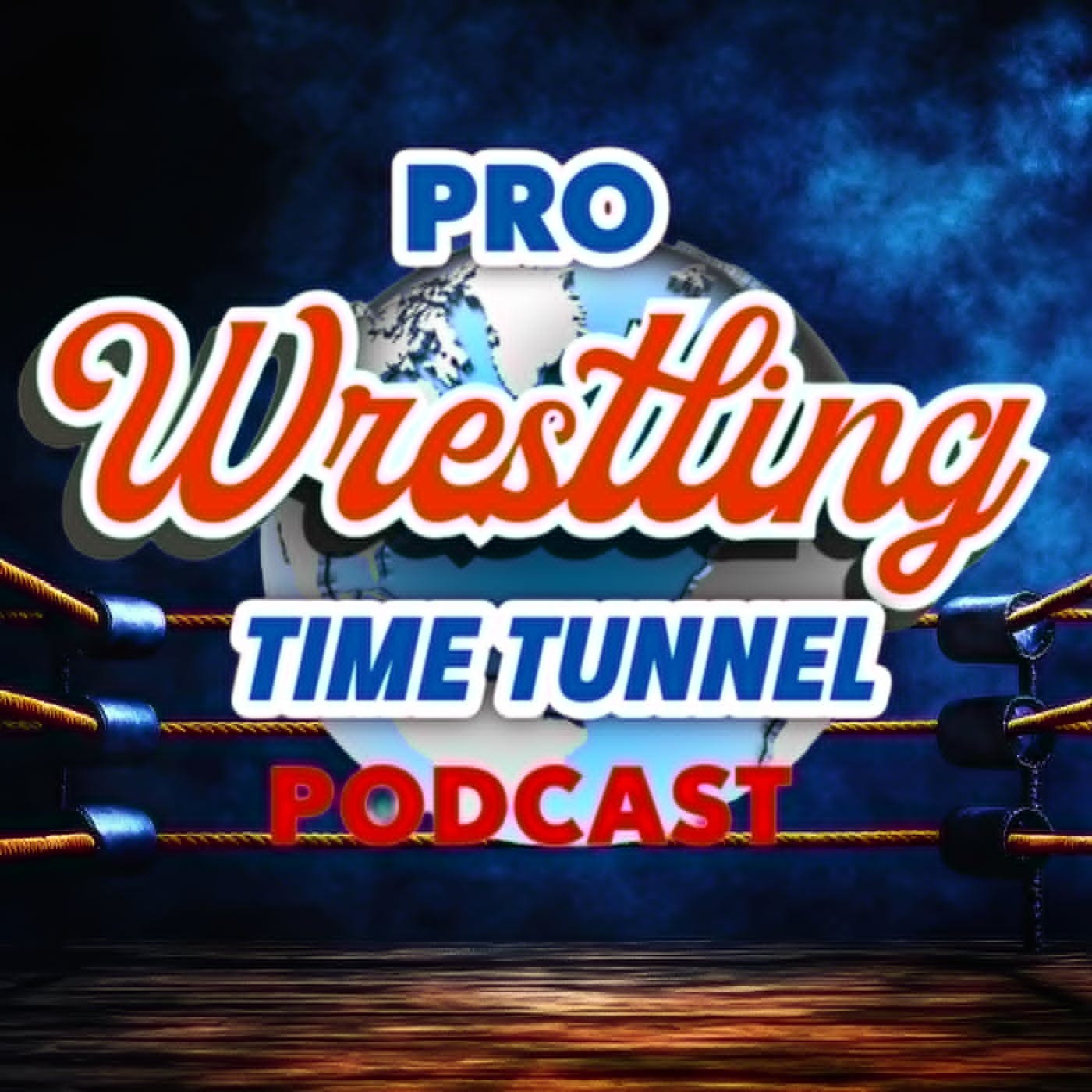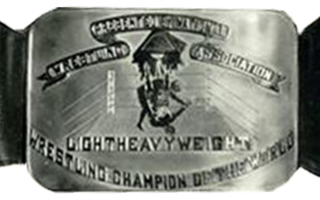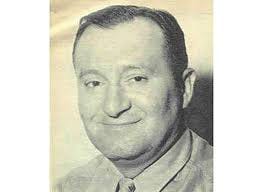Issue 64 (June 18th, 2025) Flashback 1940s: The Origins of Sam Muchnick in St Louis and The NWA in Waterloo, Birthdays, One Thing, MORE
Welcome to the Pro Wrestling Time Tunnel Daily Chronicle. The daily habit for an injection of significant events that happened on this day and relative time frames in Pro Wrestling History.
June 18th in the Tunnel:
Happy Birthday to those who have passed on and to those great wrestlers still with us:
In Memoriam:
Vic Weber 1905
Al Szasz 1913
Abe Jacobs 1928
Pablo Crispin\Great Goliath 1934
Larry "the Axe" Hennig 1936
George McCreary 1944
Frank Goodish\Bruiser Brody 1946
Salvadore Bellomo 1951
Mitsuharu Misawa 1962
Melissa Coates\Super Genie 1969
Happy Birthday:
Vito LoGrasso\Big Vito (61)
Kenneth Stasiowski\Kenny Kaos (55)
Justin Rocheleau\Bam Neely (50)
Andy Dalton (40)
Brandon Bodgle\Cutler (38)
Anna Khozina\Masha Slamovich (27)
RIP Memorial: We stop & remember those who have passed on this day and gave themselves to the business for us, the fans. We salute you and thank you.
Frank Gary "Rip" Collins\Kentucky Mountaineer\Scufflin Hillbilly 6-18-1993 (age unknown)
Leon White\Big Van Vader 6-18-2018 at the age of 63
New Pro Wrestling Time Tunnel Podcast Out Today
Personalities, Territories, Towns and Buildings
On my podcast show, we are tracking and documenting the history of pro wrestling from its beginnings through 1990, with the special emphasis on the 50, 60s and 70s.
We are profiling personalities by having the authors who have studied their lives and written their stories, we are studying and re-visiting territories and the booking offices that controlled them, historic towns where the history of pro wrestling is so deep and the legendary buildings where the fans came to see their favorite stars and storylines play out virtually every single week. We are covering all four of those dimensions of the sport of pro wrestling and I am so appreciative you have decided to allocate some of your time to go on this journey with us through this show.
On Today's episode, my guest is Michael Norris, undoubtedly the most knowledgeable historian on the subject of wrestling in the Gulf Coast region of the United States.
Today, Michael gives us an incredibly deep history of professional wrestling in the states of Alabama, Mississippi, Louisiana and Western Florida. He takes us from the 1930s up through the 1960s to get us where we cover the Spring of 1975 in Gulf Coast Championship Wrestling owned and run by Lee Fields. We discuss the towns of Mobile and Dothan, Alabama, Gulfport and Hattiesburg, Mississippi, Panama City and Pensacola, Florida, those arenas and much, much more. I am so excited about having Michael take us through the history of the Gulf Coast Territory.
The Personalities, Territories, Towns and Buildings Show is sent out on a separate post and email to all our free subscribers, so be sure and check it out today!
Please support our work by liking, subscribing, restacking, commenting and sharing our content to help support your interest in my work to preserve pro wrestling history.
Select Pro Wrestling Time Tunnel Match and Event Flashbacks
80-Year Flashback: 1948
6-18-1948: Promoters Pinkie George, Sam Muchnick, Tony Stecher, Orville Brown, Harry Light & Al Haft met at the Hotel President in Waterloo, Iowa. During the meetings and discussions, the National Wrestling Alliance was created.
What many people may not realize are the driving forces behind Sam Muchnick's action involving the forming of the National Wrestling Alliance. One of those driving forces was he wanted to promote at a sustainable, competitive level in St Louis, Missouri. Tom Packs had thus far made that not possible, holding a stranglehold not only on St Louis but a geographic area radiating out of St Louis over a large swath of the United States.
Packs controlled the group of state athletic commissioners, which made up the National Wrestling Association. This NWA had been formed in the 1930s by the National Boxing Association and was an early attempt to regulate professional wrestling in the United States. It was focused on overseeing the World Heavyweight Title and other championships by setting weight classes and standardizing rules. The Association was often challenged by independent promoters like Packs and Boston's Paul Bowser, the two promoters who dominated pro wrestling in the United States in the 1930 and 40s.
Pictured: National Wrestling Association World Light Heavyweight Championship Belt
The National Wrestling Association was a governing body and its influence was limited compared to the powerful men like Packs, so eventually the Association authorized Packs to supervise the direction of the most prized title, the World Heavyweight Championship, which dated back to 1930 and the kingpin of St Louis was only too eager to seize all that power that he could wield at will over pro wrestling which also included the ability to squash any competition. Taking over booking the champion in 1939, he was responsible for the title reigns of Lou Thesz, Bronko Nagurski, Ray Steele and Sandor Szabo.
Since launching his promotion in 1922, through a decade and a half, Packs transformed St Louis into one of the most respected pro wrestling cities in the world. His iron-fist tactics and dictatorial rulership over the sport frustrated and angered many of his fellow Midwestern wrestling promoters and in the early 1940s, an uprising had seeds planted that began to sprout.
One of those sprouts was a young Sam Muchnick, who had skipped out on his High School graduation to go to the Odeon Theatre to see Wladek Zbyszko wrestle. In the mid 1920s, he joined the staff of the sports department at the St Louis Times newspaper, where he covered the St Louis Cardinals baseball team. There, he began to learn the powerful value of relationships and he met Tom Packs. Packs was at the time, of course, the Midwest's top sports promoter. In 1932, during a merger between Sam's paper and a competitor, he left his job to become the publicist for Packs' Promotion. While working there, he was accountable for the publicity for the cards, some of the finances and even getting some booking experience.
Pictured: a young Sam Muchnick in St Louis, Missouri
From 1932 to 1941, Muchnick served as the right-hand man to Packs. An unpleasant situation arose over a boxing card that Muchnick had overseen between Joe Louis and Tony Musto in 1941 that profited Packs' organization, $14,000. Packs compensated Muchnick a small $200 for his part in the card, which insulted Muchnick to a point where he quit the promotion. Muchnick had received advice from Jim Londos, an entrepreneur minded fellow himself, to start his own sports promotion. Tom Packs, as he had done to previous upstarts leaned heavily on Muchnick's efforts, using his connections with the state athletic commissions and his tight relationships with the local media to thwart Muchnick at every turn.
Muchnick promoted his first shows in 1942, which produced modest returns and success until Muchnick decided to enlist in the US Air Force for the remainder of World War 2. During the war, on March 11, 1943. Muchnick wrote a letter to Jack Pfefer, who had helped Sam by encouraging him to break away from Packs and then helped him with talent getting booked. In one letter, Muchnick wrote, "Understand that Toots Mondt is now with you. If so, give him my regards. If you fellows, Bauman, Sandow, White and a few others stick together, we are the biggest cinches in the world for victory after the war in our game. But we must all be united instead of pulling apart." This indicates Muchnick has some kind of cooperative effort in mind several years before the Waterloo meeting in 1948.
After the War, Muchnick returned with a new renewed sense of determination, even though he continued to face the pressures applied by Packs to mute the success of his shows. Muchnick would file court injunctions to protect the blockage of his shows, and he finally succeeded in getting clearance to promote his first show at the Kiel Auditorium on December 5th, 1945. Aligning himself with renegade Pfefer from Ohio, for talent, Muchnick drew a modest 3,771 to that first show which included wrestling stars on the downside of their careers, like Ed "Strangler" Lewis, Roy Dunn and Ed Virag in the main event and others.
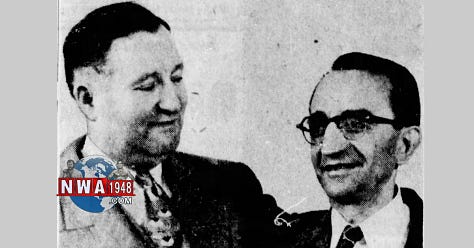
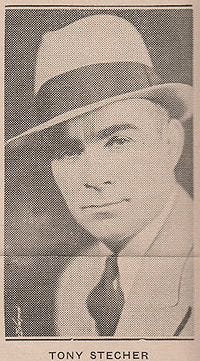
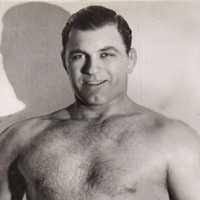
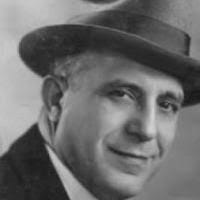
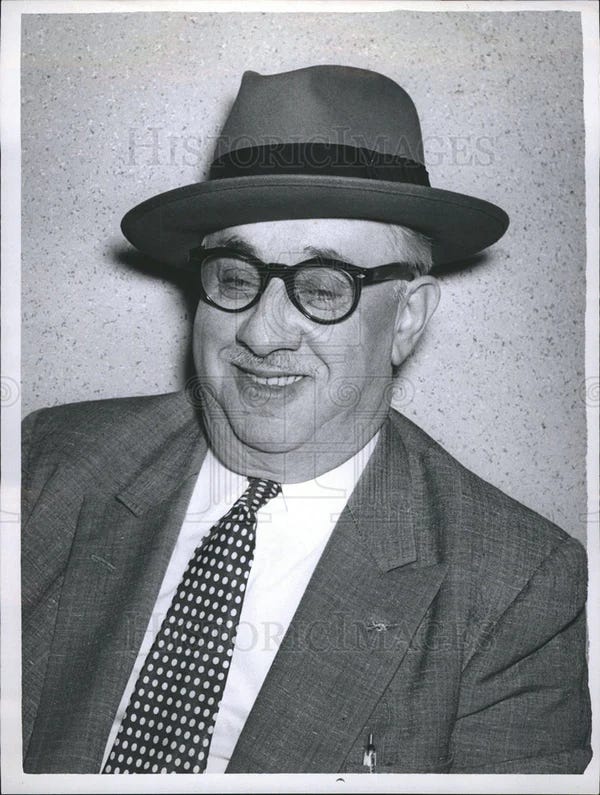
Pictured: Sam Muchnick with Pinkie George, Tony Stecher, Orville Brown, Al Haft and Harry Light, the original six promoters who planned the June 18th, Waterloo meeting in 1948
Muchnick was forced to use wrestlers several years past their primes to be talent in his shows which were not drawing well against Packs and his great young star, Lou Thesz, also a St Louis hometown guy. In the early Spring of 1948, Muchnick was contacted by Pinky George of Des Moines, Iowa and Tony Stecher of Minneapolis, Minnesota, who had talked with Brown, Haft and Haft about forming a new wrestling union. The National Wrestling Association had been formed with the idea that the state athletic commissions would be the primary members, utilizing the promoters to book the champion for shows and then share aa split of gate receipts. That balance of power had shifted to Tom Packs, who had risen to the position of czar over wrestling with an iron fist from St Louis, angering and frustrating promoters like George and Stecher.
In the future, once the National Wrestling Alliance was incredibly strong in the leveraging of talent, as Packs and the Association had once been, Muchnick as President, would use the strength of the Alliance for the advantage of his booking office members and promoters to hold down any upstart promoters who wanted to run shows in the NWA dominated towns. Muchnick, who had once been held down from success and forced to use limited talent resources would inflict the same damaging tactics on promoters who desired success as he once had but was denied in St Louis. In that same letter Muchnick had written to Pfefer in 1943, he called Packs and the National Wrestling Association, "the enemy in St Louis" because he thwarted his attempts to run against the incumbent promotion. Starting in 1948, how many times would Sam Muchnick assume the role he so despised in Tom Packs?
One Thing I Learned Today About Pro Wrestling History:
Sam Muchnick's birth name was Jeshua, he was born in Ukraine and his family was Jewish. After his family moved to St Louis in 1911, his father changed his name to Samuel because he had decided Jeshua was an inappropriate name for a Jewish child.
Thank You for Reading
I'm Tony Richards, Pro Wrestling Historian, Author and Storyteller. I share pro wrestling historical items in each issue of the Time Tunnel Pro Wrestling History Newsletter. Thanks for reading! If you enjoy my information on select events, matches and insights, please share it with folks you think might like to be a subscriber!
Remember, paid subscribers get access to exclusive and special content such as some special issues including a multi-part deep dives on wrestling territories, wrestler bios and championship title histories, special audio and video interviews on territory pro wrestling and more available in The Vault of the Pro Wrestling Time Tunnel for Paid Subscribers.






